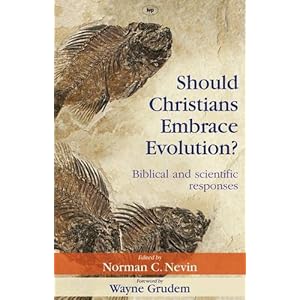
My reading seems to have a bit of a pattern to it. Throughout the year I'll mix it up, some fiction, some theology, some history, some whatever. Yet for the past few years it seems that the summer months are when I read a book or two on the matters of evolution, science and creation. Already this summer I've read Bill Bryson's A Short History About Nearly Everything, and so my second book on the topic approached the subject from a different starting point.
Norman C Nevin edited and compiled the volume 'Should Christians Embrace Evolution: Biblical and Scientific Responses', which is an interesting read, and very useful when approaching these controversial topics from a theological position. The subtitle basically gives the breakdown of the chapters, although there seem to be seven from a theological perspective, and three or four from a scientific background.
The theological chapters were very good, coming from various experts in their fields. Various vital issues are at stake - including the language of Genesis, the nature of Adam and Eve, the fall and death, the grand scheme of creation, redemption and eschatology, and the nature and character of God. There were some gems of quotes, including the following:
'There is much more to embracing evolution than suggesting different ways of interpreting the creation passages of Scripture.'
'The role Adam plays in Paul's theology makes Adam's historical reality integral to the basic storyline of Paul's gospel.'
'Adam fell downwards, not upwards' (on the impossibility of death as bringing improvement, as required by Darwinian evolution)
When attention is turned to the scientific issues, there are some helpful aspects drawn out, with a useful reminder that science is the basic reporting of inquiry and experiments, whereas the whole package of Darwinian evolution is a philosophical approach using the basic observations in a particular way for a particular agenda. The same evidence can lead to other conclusions which are currently out of vogue in the scientific realm.
'Far from being an engine for beneficial change, mutations are a downhill slope.'
'It follows that, even in principle, some quite different explanation is required to account for the origin of life.'
'The origin of such a system presents a paradox of the "which came first: the chicken or the egg?" variety. The DNA information is needed to build the protein machinery, but only the specific protein machinery can read the instructions! This set-up proclaims design about as loudly as any evidence could.'
It's a very helpful book, with lots of reasons to commend it. However, there were also a few things that have to be flagged up which might take away from the book.
First of all, it appears that (as may commonly happen), this book was written and compiled in response to another book. In a good number of the chapters specifically written for this volume (rather than having been used in this volume from prior sources), there are repeated references and refutations of the work of Denis Alexander in his book Creation or Evolution: Do We Have To Choose? Given its context, this volume may be best read in conjunction with Alexander's - to fully appreciate the points that this book is seeking to make and correct in Alexander's approach.
Secondly, I personally find it a struggle sometimes to read these compilations. It's good to have the various experts writing on their particular subject, but I find it difficult to read, because you're just getting used to one writer's style when his chapter has finished and you're into the next author's new style.
Thirdly, and perhaps more important than my reading preferences, is that while the scientific material was good, there just wasn't enough of it. The section seems to be very brief, with a lot more that could be said and discussed. Perhaps some extra weight could be good in the science chapters, to balance the greater number and weight of the theological chapters?
Another minor quibble I had with one chapter was the assertion that 'the final number of the saved may well vastly exceed the number of the lost by an incalculably long way.' (p.69 - Greg Haslam). This is in the chapter on eschatology, with the assertion that the restoration of creation, the new heavens and the new earth will be even better than what was originally lost at the fall. Yes, indeed, but I'm not sure you can make the assertion that more will be saved than lost - how could you account for the narrow road and the broad road to destruction in this reckoning?
All in all, I think this is a good book on the theme of creation and evolution in terms of the origin of life. The theological chapters are very good, and if the science was boosted, it would be even better. Definitely one for the church bookstall, and for those who wish to further think about creation and evolution in a Biblically faithful way.
Thank you Gary. I have been on the lookout for just such a book and may well opt to buy this and the Denis Alexander book to which it refers.
ReplyDelete